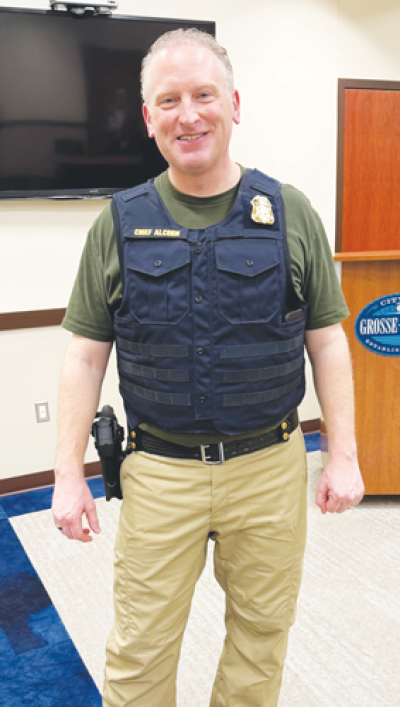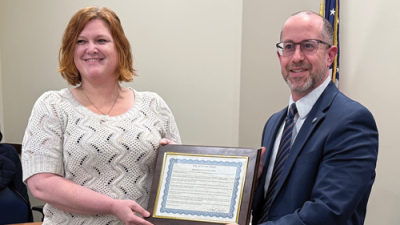
Grosse Pointe City Public Safety Director John Alcorn wears the uniform donned by members of the Crisis Intervention Team — a green shirt and khaki pants.
Photo by K. Michelle Moran
GROSSE POINTE CITY — Recognizing that law enforcement officers are often called upon to deal with situations involving individuals suffering from mental health problems or substance abuse disorders, the public safety departments of the five Grosse Pointes and Harper Woods created a Crisis Intervention Team to specifically address these matters.
And now, the CIT will have another member to respond to these challenging situations.
During a Feb. 10 Grosse Pointe City Council meeting, City Public Safety Director John Alcorn introduced Saranda Conn, who will serve as a co-responder clinician with the CIT. Conn will be working in all the Pointes and Harper Woods, sometimes going on runs with officers. Alcorn said Conn will help connect the cities to resources available through the county and state, as well as tackle casework “for those in crisis who don’t need police help, but still need help.” He said she’s the missing puzzle piece they’ve needed.
“This has been a long-term project years in the making,” Alcorn said. “I’m very proud of it. I’m excited for our communities.”
A graduate of Calvin University with a bachelor’s degree in psychology, Conn formerly worked for Beaumont Hospital in Taylor — now Corewell — as a mental health technician, and served as a youth advocate in Lansing. She is also certified as a qualified intellectual disabilities professional and children’s mental health professional. For the past two years, Conn has worked at the Guidance Center in Southgate.
Because of a grant from the Michigan Commission on Law Enforcement Standards, Alcorn said the six departments have gotten funding to pay for Conn’s position for the next two years.
“I want to welcome Saranda,” Grosse Pointe City Councilman Christopher Moyer said. “It’s going to be great (that) you’re bringing this service to our community.”
In the past, officers responding to one of these calls would have had only a couple of options — take a person to a local hospital or put them in jail. CIT is about de-escalation and connecting people to the right type of treatment so that people can find long-term solutions to mental health or substance abuse concerns, Alcorn said.
Moyer thanked Alcorn for “destigmatizing mental health crises.”
Green is the color of CIT, and officers responding in a CIT capacity show up to a scene in a special vehicle with green lights, Alcorn said. In addition, when working as part of the CIT, he said officers wear a different uniform — a green shirt and khaki pants — to distinguish them from officers in a traditional blue police uniform.
City Manager Joseph Valentine said that through this program, the departments will collect data about their CIT runs.
“The idea is to track that data,” Valentine said. “If it goes well, (we want to) continue it” past the two years that the grant is covering.
Alcorn said Conn will train officers on the CIT about available resources so that if they don’t get additional grants and can’t find funds to retain her, they’ll be better equipped to tackle the kinds of cases Conn will be working on.
Valentine credited Alcorn for his initiative.
“It takes someone to step forward and do the work to lead that charge,” Valentine said. “This initiative is cutting-edge law enforcement.”
Mayor Sheila Tomkowiak called this a “huge step forward.”
Alcorn said Conn would start work in the community in the beginning of March. She will have an office in the Grosse Pointe City Public Safety Department but will be traveling among all six departments, he said. Alcorn said she will respond to scenes with the CIT when needed. People calling the Public Safety Department shouldn’t ask for her, though — Alcorn said dispatchers are trained to know when the CIT and Conn should be sent to a scene.
 Publication select ▼
Publication select ▼























